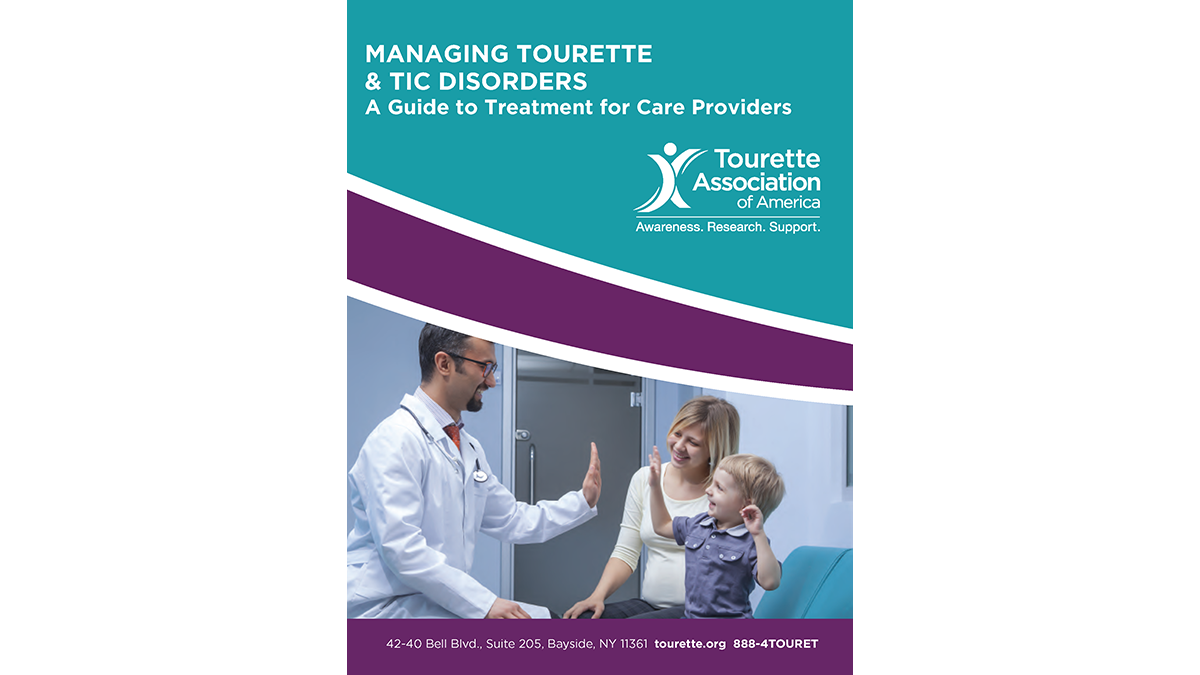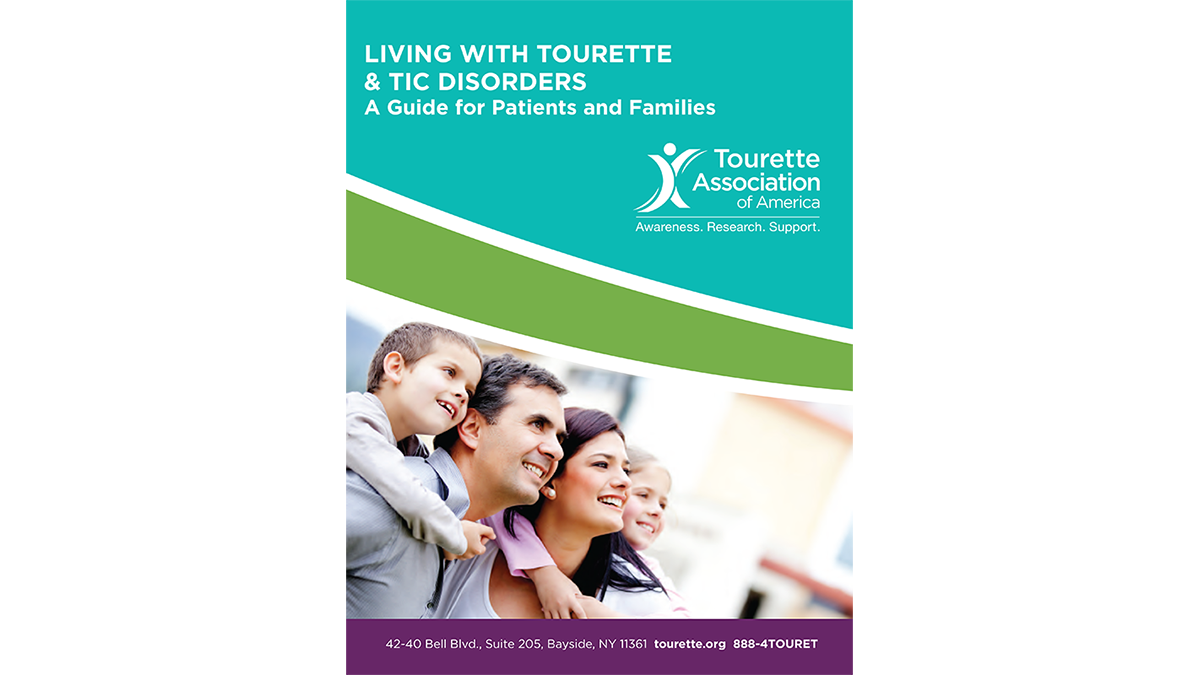Key points
- Although there is no cure for Tourette syndrome (TS), medication and behavioral treatments can help manage tics if they get in the way of daily life.
- Training and other educational resources can help parents and schools support children with TS in achieving their full potential.

Treatment overview
Although there is no cure for Tourette syndrome (TS), there are treatments to help manage the tics caused by TS. Many people with TS have tics that do not get in the way of their living their daily life and do not need any treatment. However, medication and behavioral treatments are available if tics cause pain or injury; interfere with school, work, or social life; or cause stress.
It is common for people with TS to have other conditions, particularly attention-deficit/hyperactivity disorder (ADHD), anxiety, and obsessive-compulsive disorder (OCD). People with additional conditions will require different treatments based on the symptoms. Sometimes treating these other conditions can help reduce tics. To develop the right treatment plan, people with tics, parents, and healthcare providers can work together and include teachers, childcare providers, coaches, therapists, and other family members. Taking advantage of all the resources available will help guide success.
Treatments and interventions
Medications
Medications can be used to reduce severe or disruptive tics that might have led to problems in the past with family and friends, other students, or coworkers. Medications also can be used to reduce symptoms of related conditions, such as ADHD or OCD.
Medications do not eliminate tics completely. However, they can help some people with TS in their everyday life. There is no one medication that is best for all people. Most medications prescribed for TS have not been approved by the US Food and Drug Administration (FDA) for treating tics.
Medications affect each person differently. One person might do well with one medication, but not another. When deciding the best treatment, a doctor might try different medications and doses, and it may take time to find the treatment plan that works best. The doctor will want to find the medication and dose that have the best results and the fewest side effects. Doctors often start with small doses and slowly increase as needed.
As with all medications, those used to treat tics can have side effects. Side effects can include weight gain, stiff muscles, tiredness, restlessness, and social withdrawal. The side effects need to be considered carefully when deciding whether or not to use any medication to treat tics. In some cases, the side effects can be worse than the tics.
Even though medications often are used to treat the symptoms of TS, they might not be helpful for everyone. Two common reasons for not using medications to treat TS are unpleasant side effects and failure of the medications to work as well as expected.

Behavioral therapy
Behavioral therapy is a treatment that teaches people with TS ways to manage their tics. Behavioral therapy is not a cure for tics. However, it can help reduce the number of tics, the severity of tics, the impact of tics, or a combination of all of these. It is important to understand that even though behavioral therapies might help reduce the severity of tics, this does not mean that tics are just psychological or that anyone with tics should be able to control them.
Habit reversal
Habit reversal is one of the most studied behavioral interventions for people with tics.1 It has two main parts: awareness training and competing response training. In the awareness training part, people identify each tic out loud. In the competing response part, people learn to do a new behavior that cannot happen at the same time as the tic. For example, if the person with TS has a tic that involves head rubbing, a new behavior might be for that person to place their hands on their knees, or to cross their arms so that the head rubbing cannot take place.
Comprehensive behavioral intervention for tics
Comprehensive behavioral intervention for tics (CBIT) is an evidence-based type of behavioral therapy for TS and chronic tic disorders. CBIT includes habit reversal in addition to other strategies, including education about tics and relaxation techniques.2 CBIT has been shown to be effective at reducing tic symptoms and tic-related impairment among children and adults.
In CBIT, a therapist will work with a child (and their parents) or an adult with TS to better understand the types of tics the person is having and to understand the situations in which the tics are at their worst. Changes to the surroundings may be made, if possible, and the person with TS will also learn to do a new behavior instead of the tic (habit reversal). This helps to decrease how often the tic occurs by doing a new behavior. CBIT skills can be learned with practice, with the help of an experienced therapist, and with the support and encouragement of those close to the person with TS.

In recent years, more health professionals have recognized that behavioral therapy can be very effective in managing the symptoms of TS. So far, few clinicians have been trained in these types of treatments specifically for TS and tic disorders. The CDC and The Tourette Association of America have been working to educate more health professionals in this approach to managing TS symptoms.
Free training
Supporting children and families
Parent training
Children with TS and related conditions and their families also can benefit from parent training, which has been shown to be successful among children with both TS and other disruptive behaviors. Parent training also has been shown to be helpful for children with ADHD. Parent training helps parents better understand their child's behavioral issues and learn parenting skills specific to these problems. The training might include learning about the effective use of positive reinforcement and discipline that is effective with their particular child.

Educating others
People with TS cannot help having tics and are not being disruptive on purpose. One way to help someone with TS with school, work, and other activities is to educate people about TS. When people know more about the disorder, they might be more understanding, helpful, and accommodating. For example, an employer might be willing to rearrange desk seating to provide more privacy. Or, a sports coach might encourage teammates to ignore a child's tics instead of teasing the child. When people with TS receive more support, their tic symptoms might lessen.
For more information, you can visit the following websites:
- Tourette Association of America Youth Ambassador Program and Rising Leaders Program: Training and support for teens to advocate for and talk about Tourette and other tic disorders in their community.
- Kid's Quest: Information for children to learn about people with TS and some of the issues related to daily activities, health, and accessibility.
Using school resources
TS can affect a child's experience at school. For example, some tics make it difficult to read or write. Or, a child might get distracted by tics or trying to not have a tic. In addition, because many people do not understand TS, children are sometimes teased, bullied, or rejected by other kids. However, with some planning, children with TS can have a positive, successful school experience.
Generally, children with TS have the same intelligence range as other children. But problems with tics, often combined with attention deficits and other learning difficulties, can mean that children with TS will need special education assistance. Types of assistance might include different seating arrangements, additional time for testing, or computer accommodations for children who have problems with writing. For example, if a child with TS often has a certain tic during math class, the math teacher can be educated about TS, and perhaps the child's seat can be changed so that the tics are not as visible.

An Individualized Education Plan (IEP)—is necessary for children who need special education services. AN IEP is a legal document that tells the school what it must do to help meet your child's needs.
For children who do not have an IEP, a different type of plans—called 504 plans—can be written by a committee that includes parents and teachers. A 504 plan lists your child's disability and how the school can help. This plan is updated once a year.
For more information, please visit the following websites:
- Cook CR, Blacher J. Evidence-based psychosocial treatments for tic disorders. Clin Psychol: Science and Practice. 2007;14(3):252–67.
- Piacentini J, Woods DW, Scahill L, Wilhelm S, Peterson AL, Chang S. Behavior therapy for children with Tourette disorder: a randomized controlled trial. JAMA. 2010;303(19):1929–37.
